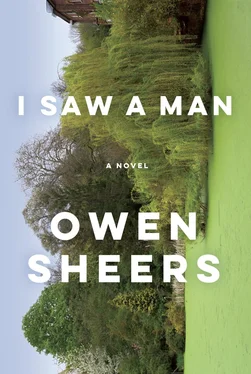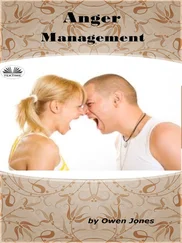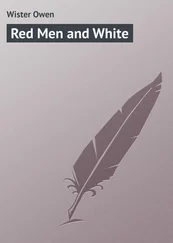“DISTANCE! DISTANCE MICHAEL! It’s your best defence!” Istvan hooked a thumb under the padded lining of his mask and slipped it up over his forehead. “You know this,” he said. “If you are so close, how can you riposte? Come on.” He rapped Michael’s coquille with his blade. “Again.”
With a tap on the top of his mask, Istvan knocked it back down over his face and took up en garde. He wore loose tracksuit bottoms, trainers, a T-shirt. A padded brown suede coaching sleeve protected his sword arm. His glove was coming apart at the seams. Two faded Hungarian flags were still stuck on either side of the mask’s wire mesh.
With a quick clatter of blades, Istvan came at Michael again, his body upright and slow in contrast to the speed of his fencing arm as he disengaged to parry in sixte before sliding his blade down Michael’s in a glisé attack. He hit Michael on the outside of the shoulder, almost exactly where he’d hit him before. Istvan stepped back into en garde. “Again,” he said, from behind his mask. “And this time think!”
But all Michael could do was think. Within the closeness of his own mask, beneath its dark wire, he felt as if he were thinking with three brains at once, and none of them his own. A tangle of humming thoughts, of competing images and sounds, flashing then passing, too quick to hold.
He was trying to focus. On his blade before him, on Istvan’s oncoming attacks, on the brightness of the sky through the high windows of the sports hall. On anything that might stop him, just for a second, from seeing the one image that remained constant: of Lucy, motionless on the turn in the stairs, her pale belly exposed, her one leg caught under her.
Everything else was indistinct. He didn’t know for how long he’d lain there at the top of the staircase, looking down at her. Or, when, exactly, he’d got to his feet and, stepping over her body, descended it to leave the house. He knew he’d closed the back door when he’d left, and that as he’d picked up his shoes he’d brushed the step clean of their soil. But he couldn’t remember entering his own garden, or his building itself. He knew he had only because the first thing he recalled was sitting on his sofa, his head in his hands, the lights and sounds of the day coming back to him. It was like surfacing from a deep dive, breaking through choppy waves into a terrible clarity of air.
As the minutes returned to him, so had the same instinctive voice that had persuaded him up those stairs just minutes earlier. But now the note of its desperation was different. Now it was telling him, while he could, that he must change the story. He must change the day’s truth. Michael shook his head against it. He wanted, with a violent desire, never to have been in the Nelsons’ house. Never to have climbed their stairs, never to have gone searching for Caroline. He wanted never to have gone into their bedroom, their bathroom. He wanted never to have been there.
The alternative was impossible for him to face. He’d only just, in these past months, begun rediscovering his life. He’d lost so much already: Caroline, their future, the man he’d have become with her. And with her fading from him in the Nelsons’ bathroom it had felt as if these losses were just minutes old. He could not, he would not, lose again. This is what the survivor’s voice had told him as he’d sat on his sofa, staring at the carpet. That if he was quick, he could still make it so. He could still shape the story. Lucy was dead. He knew that could never be changed. He’d never meant to frighten her, to cause her to start like that. If he could still save her, he would. But it was too late. So he would save himself instead. Something, he remembered telling himself, must be saved. Eventually, standing from the sofa, he’d washed his hands, collected his fencing kit from the hall, then left his flat, slipping the bag over his shoulder as he’d descended the staircase.
―
“Better! Good!” Istvan took two quick steps backwards. His body was heavy, but his feet were still light, a dancer’s feet. Somehow Michael was following his lesson, muscle memory guiding his arm, his body.
“Now,” Istvan said, raising his épée as if in salute, “when I lower my blade, attack in patinando, tempo or speed, up to you. Then counter in octave.”
Michael bent his knees to en garde, his eyes on the switch at the end of Istvan’s blade. As it fell, he took a short step forwards, then lunged, extending his arm towards Istvan’s stomach. Disengaging from the parry, he pushed forward until he felt his own switch depress, and his blade flex in the curve of a hit.
“Good!” Istvan exclaimed, skipping backwards. “And again!”
―
When Michael had left his building there’d been no one else on the street. At the end of the path to his front gate, he’d turned up the hill passing the Nelsons’ house, its windows as impassive as any other, then continued up the incline to turn left down a narrow path. Emerging from the shade of this cut-through, he’d crossed a tarmac walkway bisecting two of the ponds before leading on into the Heath itself.
Nothing was altered. A male moorhen ducked for food in the pond to his left, then paddled to a piled nest to feed his chicks. To Michael’s right, farther off, the mixed swimming pond, in full sunlight, was pointillist with swimming costumes and bare bodies. He could make out a line of girls queuing for the showers. The red-and-yellow uniforms of the lifeguards, looking on. The white buoys, bobbing in the swimmers’ wakes.
As he’d reached the Heath itself, here, too, the scene appeared unchanged from earlier in the day. Picnics, prone sunbathers. A boy on a scooter, about Lucy’s age, was backheeling himself along the path, outstripping his mother, who was pushing a pram behind him. “Joseph!” she shouted as he crested a rise. “Joseph! Slow down!”
Michael had walked on. He’d wanted to keep his eyes on the ground, to avert his gaze from anyone who might see him. But at the same time he couldn’t help glancing up at the Heath around him, at its life, so abundant and insouciant. A woman in a bikini was talking on her phone; a shirtless man in jeans spread himself across a bench, ridges of fat pinking around his midriff. Another man, propped on his elbows on the grass, tilted his head back, eyes closed to receive the sun.
How could nothing have been disturbed by what he’d done? Just minutes and metres away a life had ended. Two lives, perhaps. A four-year-old cache of memories, ideas, pains, favourite colours and toys had been extinguished. A genetic pattern, unique in the universe, had been snuffed out. Features and qualities of her parents, her grandparents, great-grandparents, had all died in the instant of Lucy’s fall. And as they had, within seconds, his own life had been burdened with the weight of hers. In an attempt to see Caroline again, he’d taken Lucy away. There would be aching ripples of grief, coursing through Samantha, Josh, Rachel — and through hundreds of others he didn’t know. Lives would change. The hue of the years to come, although they were unaware, was already tainted for these people, the shade of their existence already darker. And yet out here, on the Heath, under an afternoon sun, nothing had altered. What Michael, and Michael alone, knew seemed to make a mockery of time and space, of the very meaning of those words. As if in causing Lucy’s death he’d proved everything to be illusion.
But it was not illusion. This is what he’d also known as he’d traversed the Heath, his fencing bag slung over his shoulder. It might have felt unreal, there in the open air, beyond the walls of the Nelsons’ house. But it wasn’t. It was very real. It was true, and Michael had known he had only minutes to write himself out of that truth.
Читать дальше











